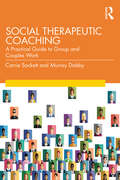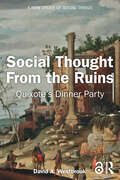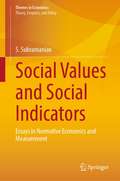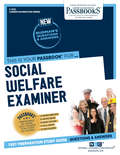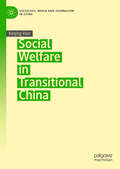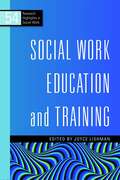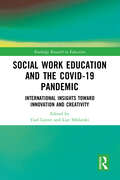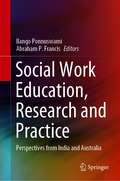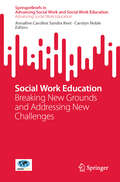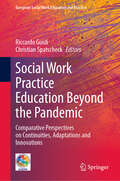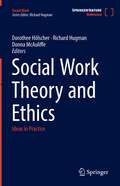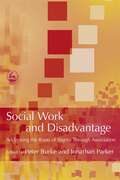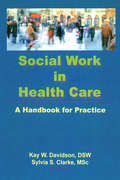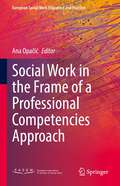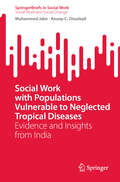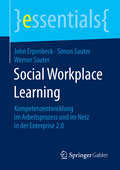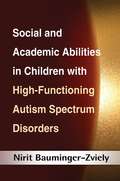- Table View
- List View
Social Therapeutic Coaching: A Practical Guide to Group and Couples Work
by Carrie Sackett Murray DabbyCombining social therapeutics with the practice of coaching, this book guides coaches and mental health professionals in how to coach groups and couples using this innovative method. Drawing from the authors’ combined 50 years of experience, Social Therapeutic Coaching: A Practical Guide to Group and Couples Work empowers practitioners to break away from focusing on individual change to focusing on groups and their emotional growth. Early chapters touch on the history of coaching and powerful discoveries of social therapeutics before diving into how to lead a social therapeutic group. Sackett and Dabby explain how to incorporate the concept of human relationality into coaching sessions, demonstrating how it extends group work beyond assembling like-minded individuals with similar goals into bringing together diverse people with diverse issues that they want to work on and grow around. It also brings a fresh lens to working with couples, in which the focus is on discovering what "the relationship" needs, rather than trying to get individuals to compromise, change or work towards a preconceived shared vision for an end goal. Written in an accessible style and filled with extensive case studies and examples, Social Therapeutic Coaching provides a powerful toolkit for coaches, counselors, psychotherapists, social workers, HR and talent development professionals, community-based leaders and social entrepreneurs.
Social Thought From the Ruins: Quixote’s Dinner Party (A New Order of Social Things)
by David A. WestbrookThrough stories, conversations, and essays, this book pursues interwoven critical and philosophical inquiries into the nature of the contemporary in the North Atlantic, asking how are we to live as intellectuals, individually and in community?Social Thought From the Ruins: Quixote’s Dinner Party is the product of informal discussion and academic work done over the last two decades among an international group of social scientists. An extended critique of academic life today and the context of our own thinking, this book interrogates aspects of our modernity, with its pervasive sense of crisis and uncertainty, and the difficulty of thinking clearly about things like the state and power, data and violence. Reflecting that the United States, indeed the North Atlantic countries, seem to have entered autumn, David A. Westbrook asks what spring might be. Will the critical social sciences have anything to offer the exercise of power, or are we doomed to incessant and ineffectual critique? Can bureaucracy be made at least more accountable, if not democratic? Conversely, can we feel less alienated from the structures of power that rule us, or that fail to govern at all? Can we feel at home?The Open Access version of this book, available at www.taylorfrancis.com, has been made available under a Creative Commons Attribution (CC-BY) 4.0 license.
Social Values and Social Indicators: Essays in Normative Economics and Measurement (Themes in Economics)
by S. SubramanianThe book is a collection of essays written since 2010, and dealing, in one way or another, with the place of values in economic analysis. The centrality of values in the collection is not surprising, given that the thematic concerns informing the essays in the book relate principally to methodological issues in economic enquiry, to the normatively constrained aggregation of personal preferences into collective choice, and to problems of logical coherence and ethical appeal in the axiom systems underlying the measurement of economic and social phenomena such as poverty, inequality and literacy. While many of the essays are more or less technical in nature, they are all explicitly motivated by considerations that go beyond the formalisms of presentation to an involvement with the role of moral reasoning in economic analysis. In particular, the essays emphasize the importance of ‘ought propositions’ in a science which is all too often regarded as being wholly and exclusively ‘positive’ in its orientation. The book should be of particular interest to researchers, students, and public policy makers.
Social Welfare Examiner: Passbooks Study Guide (Career Examination Series #C-2132)
by National Learning CorporationThe Social Welfare Examiner Passbook® prepares you for your test by allowing you to take practice exams in the subjects you need to study. It provides hundreds of questions and answers in the areas that will likely be covered on your upcoming exam, including but not limited to: interpreting and applying written social welfare program materials; basic arithemtic for determining eligibility; recording case notes; interviewing; and other related areas.
Social Welfare Examiner: Passbooks Study Guide (Career Examination Series #C-2132)
by National Learning CorporationThe Social Welfare Examiner (Spanish Speaking) Passbook® prepares you for your test by allowing you to take practice exams in the subjects you need to study. It provides hundreds of questions and answers in the areas that will likely be covered on your upcoming exam.
Social Welfare in Transitional China (Sociology, Media and Journalism in China)
by Keqing HanAt a time of significant transformations in Chinese society, this book addresses the key issue of social welfare and the reform of the welfare system in 21st century China. Considering both the theory and policy making across a variety of welfare issues which directly impact on the country’s economic development, it examines the development of civil society, changes in social stratification and in social class structure. It notably considers the key questions of welfare in both urban and rural settings, for different population groups such as children, the elderly and the disabled, addressing topical issues of housing, education, public health, poverty and the restructuring of related welfare policy system to tackle China’s key issues. It also considers the impact of migrant workers in China and their social integration, including within the welfare system. Providing a unique insight into how economic globalization and financial crisis affects Chinese social welfare policies, this book is a key read for scholars worldwide interested in social transformation in Chinese society at a time of significant social and economic transition.
Social Work Documentation: A Guide to Strengthening Your Case Recording, 3rd Edition
by Nancy L. Sidell"Designed to help practitioners build writing skills in a variety of settings, Social Work Documentation is a how-to guide for social work students and practitioners interested in good record keeping and improving their documentation skills. This popular, must-have resource provides practical advice on current practice issues such as electronic case recording, trauma-informed documentation, and assessing and documenting client cultural differences of relevance. This third edition is updated to view documentation through person-first language, and includes a chapter on bias-free language selection, with examples and exercises to ensure appropriate wording choices are used related to age, disability, immigration and socioeconomic status, and gender and sexual orientation"--Provided by publisher.
Social Work Education and Training
by Joyce LishmanExcellent social work education and training is vital for ensuring best practice, and it is important to understand the key approaches and methods in order to provide the best teaching and ensure effective learning. This volume provides an overview of social work education, including the background and current context. It covers the key debates surrounding social work education, such as the evaluation of social work education, the use of IT, research-mindedness, and the effectiveness of interdisciplinary education. The book also offers guidance on effective teaching and learning approaches tailored to the needs of social work educators, covering teaching within a higher education institution, on student practice placements, and in post-qualifying settings. This will be an indispensable text for educators and trainers in the field of social work.
Social Work Education and the COVID-19 Pandemic: International Insights toward Innovation and Creativity (Routledge Research in Education)
by Yael Latzer Liat ShklarskiThis book examines how the shift to remote teaching in March 2020 due to the global pandemic created new opportunities for innovation and creativity and shaped how social work classes were taught, with many temporary changes now part of permanent, standard practice. Drawing on narratives from 20 social work leaders across 17 different countries, the chapters explore particular themes and viewpoints on lessons learned during the pandemic, including case studies to examine copying mechanisms, insights into the transition to remote teaching, and the creative lessons that were learned. By taking an international perspective, it represents a key contribution to the scholarship of social work leaders from around the world concerning how institutions transitioned to remote learning and teaching and how these lived experiences and new discoveries are contributing to and influencing current practice. As such, it will appeal to social work educators, researchers, and field educators around the world with interests in experimental curriculum and field practice.
Social Work Education in Europe: Traditions and Transformations (European Social Work Education and Practice)
by Nino Žganec Marion LagingThis contributed volume provides an in-depth overview of current social and socio-political transformations in Europe and their effects on social work and its educational structures. It elucidates these transformations and structures at the individual level of ten different countries and goes on to elaborate a European perspective in this field. Readers gain insight into the variety in social work and its educational structures in Europe and, at the same time, readers receive starting points for the exchange of ideas, collaboration and further development in the individual countries and in Europe. The introduction outlines the current developments and challenges facing social work education in Europe, contextualizing the topics to be covered in the volume. Each chapter offers an individual country profile of social work, including an analysis of typical examples of different traditions of educational models for social work that, collectively, provide insight into an overall "European model of education for social work". The countries selected represent all parts of Europe:FinlandLatviaGermanyUnited KingdomThe NetherlandsFranceItalyCroatiaRomaniaCyprusEuropean Social Work Education: Traditions and Transformations is an essential resource – an up‐to‐date and differentiated inventory of social work education in Europe from a horizontal and vertical perspective – which describes fields of work and approaches that prepare students to practice social work, examines the degree of academization of the discipline and investigates its structures and conditions. Social workers and social work educators, researchers and practitioners will find this an engaging and useful text.
Social Work Education, Research and Practice: Perspectives from India and Australia
by Ilango Ponnuswami Abraham P. FrancisThis book addresses a range of key issues concerning social work education, research and practice in India and Australia from a cross-cultural perspective. The respective chapters focus on specific areas of social work regarding e.g. the status and recognition of the profession, regulatory mechanisms, roles and functions of social workers in different settings, and issues and challenges faced by the social work community. The book shares valuable perspectives to help understand the culturally sensitive practice of social work in various socio-cultural, economic and political contexts in both countries. Given the scope of its coverage, the book is of interest to scholars, students and professionals working in the areas of social work, social development and social policy practice.
Social Work Education: Breaking New Grounds and Addressing New Challenges (SpringerBriefs in Advancing Social Work and Social Work Education)
by Carolyn Noble Annaline Caroline Sandra KeetThis book addresses the critical question of whether social work as an universal discipline is able to respond to new social challenges that arise from a changing world that pose new sets of challenges for people in precarious situations and create calamitous psychological burden for populations. These require critical skills that need to be developed through social work education in an environment where local and global social work ethics are fused and interrogated in our classroom spaces. There is a need to address the disjuncture between curriculum content, language of text used for instruction and local realities. As a universal discipline, social work education must play a transformative role and create an enabling environment that produces graduates that are able to respond to life experiences in a global social order while also being purposeful about centering local knowledges. Transforming social work education for a new era does not rely on singular issues but demands engagement around a multitude of issues that, if addressed, enhances the responsiveness of the discipline in different contexts. The authors, who work and teach across various settings, countries, contexts and cultures, address the role that social work ought to play during and after global events like the COVID-19 pandemic, climate change, and war and conflict. It speaks to a social work that acknowledges our interconnectedness with nature, offering an educational framework that centers the politics of sustainable development. Social work students come from communities where they, themselves, have different levels of access to educational spaces. The book also looks at new ways of delivering education content, making social work training accessible to a broader population. Among the topics covered: Learning Social Accountability Through Social Work Field Education Online Teaching, eCourses and Innovative Programmes in Social Work Distance Education Teaching Reproductive Justice in Social Work Education Social Work Peace Studies Social Work Values and Education Social Work Education: Breaking New Grounds and Addressing New Challenges addresses a range of issues that social work education needs to craft in the future and is designed to support students and professionals for practice, in placement, and teaching and curricula practices.
Social Work Leadership and Management: Current Approaches and Concepts for Social and Human Service Organisations (SpringerBriefs in Social Work)
by Maik ArnoldThis book describes the transformation of leadership and management in the context of selected newer leadership approaches in social work and human service organisations. It is an essential primer that focuses on the extent to which the approaches presented help managers in social enterprises deal with current challenges in depth and to develop suitable answers to questions such as: What is leadership? How does this differ from management? What leadership qualifications do executives currently need for long-term and future-oriented management?Leadership and management in social work and human service organisations are constantly confronted with various challenges: employees want to be supported individually; managers must be able to act in an entrepreneurial manner; the organizational culture should be developed from a holistic point of view. Self-management in self-organised work contexts is increasingly the focus. In addition, organisations and the employees working in these institutions must struggle with constant changes in the environment under volatility, uncertainty, complexity, and ambiguity (VUCA) conditions.Based on an overview of classic and newer leadership approaches, this book introduces readers to selected concepts and theories relevant to the social economy, which various current textbooks in general business administration and specifically in social work management do not provide in a concise way. After introducing an innovative translational leadership framework, the book places leadership and management theories and approaches at the centre of the discussion that help to reflect on the application and adaptation of leadership styles in social work practice. Additionally, the book discusses changes taking place in the social and economic environment as well as in attitudes of agile leaders, in the practice of adaptive and digital leadership.Social Work Leadership and Management: Current Approaches and Concepts for Social and Human Service Organisations is specifically geared to the needs of social work educators, students, researchers and practitioners in academic and agency (social and human service sectors) settings who can acquire knowledge and skills to support the viability and positive functioning of social work organisations, and to engage with other individuals, groups, and organisations.
Social Work Practice Education Beyond the Pandemic: Comparative Perspectives on Continuities, Adaptations and Innovations (European Social Work Education and Practice)
by Riccardo Guidi Christian SpatscheckThis book offers unprecedented knowledge about how social work practice education has been restructured under the challenges of the COVID-19 pandemic and how the adaptations and innovations generated during this time have become a supplementary tool of current social work education worldwide. Based on the European research project "SWooPEd – Social Work Practice Education in Times of Pandemics, and Beyond. Continuities, Changes and Innovations in Europe", this contributed volume provides a unique international perspective from different European countries that are accomplished through insights from authors in other continents. The book addresses topics through a 'glocal' approach, using a comparative perspective and a multi-method design. It adopts the IASSW-IFSW "Global Standards for Social Work Education and Training", as well as considers the heterogeneity of national social work education systems in Europe, North America, Africa, and the Asia and Pacific region. The volume's contents are organized in three sections: In Part I, the authors compare the structures and designs of social work practice education programs and the reactions of the schools of social work to the COVID-19-related restrictive measures on a European level. In Part II, the authors provide in-depth analyses on how the pandemic experimentations have been re-adapted and used in some European countries and which innovations and findings were identified that could be integrated now and in the context of other crises. In Part III, the authors contextualize these experiences and display the paths and analyses from schools in non-European countries, as well as finally identify the crucial current challenges and opportunities for social work practice education at a global level. Social Work Practice Education Beyond the Pandemic is a key reference for the global community of social work education including academics, educators, field instructors, practitioners, and students. It provides an inspiring source for all the innovators in the field of higher education in social work and highlights how social work practice education can be designed in a more resilient and sustainable way that directs social work practice education into the future.
Social Work Theory and Ethics: Ideas in Practice (Social Work)
by Richard Hugman Dorothee Hölscher Donna McAuliffeThis reference work addresses the ideas that shape social work. Much of the social work literature addresses questions of theory and ethics separately, so that the body of thought that is represented in social work scholarship and research creates a distinction between them. However, the differences between these categories of thought can be somewhat arbitrary. This volume goes beyond this simple separation of categories. Although it recognises that questions of theory and ethics may be addressed distinctly, the connections between them can be made evident and drawn out by analysing them alongside each other.Social work's use and development of theory can be understood in two complementary ways. First, theory from the social sciences and other disciplines can be applied for social work; second, considered, systematic examinations of practice have enabled theory to be developed out of social work. These different approaches are usually referred to as 'theory for practice' and 'practice theory'. The advancement of social work theory occurs often through the interplay between these two dimensions, through research and scholarship in the field.Similarly, social work ethics draw on principles and concepts that have their roots in philosophical inquiry and also involve applied analysis in the particular issues with which social workers engage and their practices in doing so. In this way social work contributes to wider debates through advancement of its own perspectives and knowledge gained through practice.Social Work Theory and Ethics: Ideas in Practice offers a unique approach by bringing together the complementary dimensions of theory with each other and at the same time with ethical research and scholarship. It presents an analysis of the ideas of social work in a way that enables connections between them to be identified and explored. This reference is essential reading for social work practitioners, researchers, policy-makers, academics and students, as well as an invaluable resource for universities, research institutes, government ministries and departments, major non-governmental organisations, and professional associations of social work.
Social Work and Antisemitism: Issues and Interventions
by Carole B. Cox Dana B. MarloweThis timely book on social work and antisemitism fills an important gap in social work education and in the profession. The ethics and framework of the social work profession demand that it confronts oppression and prejudice while working for a socially just society. However, education on antisemitism is seldom included in social work curriculum or in diversity, equity, and inclusion (DEI) programs. This text addresses this need for education and intervention, and includes a teaching guide for use in social work curriculum as well as social work practice. Antisemitism, hatred and discrimination against Jewish people and Jewish institutions, is perhaps the oldest form of oppression. Throughout history, as with other oppressions, myths and stereotypes to substantiate antisemitism were developed. More recently, however, antisemitism has been increasing steadily across the globe. Combatting and dismantling it is critical for both Jewish people and institutions, the social work profession, and for society. In the book, the authors discuss antisemitism's history, the role of the Holocaust, contemporary manifestations of antisemitism, and its impact on individuals and societies. Among the topics covered are: Introduction: Human Rights, Social Justice, and Social Work Palestine, Israel, and Zionism Contemporary Antisemitism Antisemitism and Mental Health Antisemitism: A Guide for Teaching and Social Work Practice Social Work and Antisemitism: Issues and Interventions offers a foundation for combatting antisemitism and addresses the need for social work involvement. The book can be used as a primary or secondary text for courses that cover diversity, human rights, human development, ethnicity, oppression, and mental health in Bachelor- or Masters-level programs in schools of social work. In addition, the book can be used in other programs, such as DEI, or by other disciplines interested in learning about and educating about antisemitism.
Social Work and Disadvantage: Addressing the Roots of Stigma Through Association
by Peter Burke Jonathan ParkerThis book is a guide to understanding the important issue of stigma - `associated disadvantage' - which affects not only those who are excluded from society, but also family members and friends. Social Work and Disadvantage explains the impact of stigmatization on siblings, families and workers in the caring professions and its consequences for the people it affects and for society as a whole. Contributors provide evidence from research and professional practice on transferability of health and social problems in, for example, dementia care patients, drug users and looked after children. Providing key messages for practice, they outline a range of protection measures to reduce the risk of stigma and victimization. Social Work and Disadvantage provides valuable advice and guidance for social work and health care practitioners, educators and students.
Social Work in Health Care: A Handbook for Practice (Social Work In Health Care Ser. #Vol. 12, No. 3)
by Kay DavidsonHere is an outstanding reference book of major readings in the field of social work in health care. Practitioners, educators, researchers, and students can use this landmark two-part volume to review dominant themes and critical issues in today’s practice environment and to understand the evolution of current trends and emerging policies and programs. In this one desktop source book, hundreds of references relevant to the health care social work field are immediately accessible. Education, policy, practice, and research issues integral to social work’s expanding role in health care are the main focus, with each chapter highlighting a theme of enduring importance to the field. Other outstanding articles related to the chapter’s theme are cited in the appendix to each chapter which also includes a selected bibliography of suggested topical readings. Comprehensive new book filled with information vital to social workers in the health care field! Over 900 pages of scholarly articles by the foremost social work leaders in health care! 9 categories embrace the range of social work activity in the health care field! Exciting new ideas and practical suggestions for everyday dilemmas! Hundreds of references immediately accessible in one desktop source! Selected bibliography of topical headings provides sources for even more relevant articles! A MUST HAVE volume for instructors and students! Deepen your understanding of all aspects of social work practice in health care with this superb volume! Here is an outstanding reference book of major readings in the field of social work in health care. Practitioners, educators, researchers, and students can use this landmark two-part volume to review dominant themes and critical issues in today’s practice environment and to understand the evolution of current trends and emerging policies and programs. Social Work in Health Care makes hundreds of references relevant to the health care social work field immediately accessible in this one desktop source book. Education, policy, practice, and research issues integral to social work’s expanding role in health care are the main focus, with each chapter highlighting a theme of enduring importance to the field. Other outstanding articles related to the chapter’s theme are cited in the appendix to each chapter which also includes a selected bibliography of suggested topical readings. Find answers and ideas for everyday dilemmas in this all-inclusive, information-packed volume!Social workers practicing in the rapidly expanding health care field call upon a repertoire of skills to fulfill a variety of functions including direct patient care and contact with patients’families, education, and influencing organizational policies on their clients’behalf. The in-depth scholarship and the diversity of multiple approaches to health care social work, as presented in Social Work in Health Care, will have a strong impact on the field. Through the intertwining network of education, policy, practice, and research issues in the book, and professsional discussion of those topics, a beginning point exists from which social workers can develop principles to guide their social work activities in the medical and health fields.
Social Work in Post-War and Political Conflict Areas: Examples from Iraqi-Kurdistan and beyond
by Cinur Ghaderi Kristin SonnenbergThe book offers unique access to theoretical approaches and practical examples of international social work in the context of war and conflicts. The reader gains knowledge about the competences and role of social work, which contributes to mitigating the effects of war and conflict. The book raises the question of how to connect international social work with local approaches and offers suggestions for a development of social work with respect to exchanging knowledge and experiences between the West and the East, the Global North and the Global South. It furthermore discusses the role of social work in reducing the problem of gender-based violence and in the methods of peacebuilding processes in post-war and post-conflict societies.
Social Work in Schools: Principles and Practice
by Linda OpenshawThis accessible and authoritative text gives social workers the tools they need for effective and ethical practice in school settings. Readers learn practical skills for observation, assessment, intervention, and research that will enable them to respond to the needs of diverse students from preschool through the secondary grades. The book presents strategies for dealing with particular problems, such as violence, trauma, parental absence, substance abuse, bereavement, and mental health concerns. Also reviewed are developmental issues that can interfere with school success. Specific guidelines for implementing interventions, including group work, are provided. Student-friendly features include many concrete examples; study and discussion questions; and reproducible letters, forms, and checklists.
Social Work in the Frame of a Professional Competencies Approach (European Social Work Education and Practice)
by Ana OpačićThis book serves as an introductory reader for understanding a professional competencies framework for social work through a new approach. It not only discusses what professional competencies are and why they are significant, but it also shows how to develop a professional competencies approach, measure and research competencies, and learn how to use them to empower professional identity and career development. There has been growing interest to define the social work profession within a professional competencies framework. Professional competencies are considered in their complexity as a triangle of knowledge, skills and values. They are not solely a tool for education and practice, but they are also important for professional socialization and identity in social work. A professional competencies approach has been used to define standards and expectations for social workers-practitioners; it is an evaluation tool for formal education and lifelong learning programs, provides guidance for field practice and placements for social work students, and could be a frame for distinguishing levels of professional expertise. The volume provides an up-to-date, comprehensive overview of a professional competencies approach in social work with 10 chapters organized in four sections:Part I: Understanding a Professional Competencies Approach, including Criticisms of the Competency-Based Education ApproachPart II: Major Areas of Professional Competencies, including Leadership and Professional Socialisation Part III: Measuring Professional Competencies and Education Outcomes, including How to Conceptualise, Operationalise and Measure Professional Competencies in Social WorkPart IV: Professional Competencies and Professional Development, including A Model of Holistic Competence in Social Work and the unique Professional Capabilities Framework Social Work in the Frame of a Professional Competencies Approach is essential reading for social work instructors, academics and national professional associations interested in developing or reviewing their professional competencies framework. It is an invaluable resource for experts in statutory bodies that set up a legislative framework of social work practice or work in the accreditation of social work education programs. The book is useful for social work students interested in understanding the theoretical background of social work, as well as for field practitioners who wish to use professional competencies for their self-reflection, self-evaluation and professional identity.
Social Work with Populations Vulnerable to Neglected Tropical Diseases: Evidence and Insights from India (SpringerBriefs in Social Work)
by Muhammed Jabir Anoop C. ChoolayilThis book discusses the need to establish social work for Neglected Tropical Diseases (NTDs) with an emphasis on the emerging role of effective and sustainable social interventions for the control and elimination of NTDs. NTDs are a group of infectious diseases prevalent in tropical and subtropical regions, causing significant morbidity and mortality to the world's poorest populations but receiving relatively lesser attention. They significantly affect communities with poor financial resources, inadequate sanitation and limited healthcare facilities, indicating their social dimension. Addressing NTDs requires multifaceted strategies that consider environmental, social, and economic factors, with socioeconomic factors emerging as a critical determinant. The global battle against NTDs has seen significant progress, yet social workers’ involvement remains limited, particularly in high-prevalence regions like India. This stems from undefined roles and a lack of focus within existing NTD frameworks. Integrating social work into NTD intervention is crucial for addressing the diverse challenges associated with these diseases, especially the social dimensions. Social workers, by advocating for health equity, engaging communities, addressing social determinants, and collaborating with healthcare professionals, can contribute significantly to the broader efforts in mitigating the impact of NTDs on vulnerable populations. This book builds on the social nature of NTDs to argue for the case of NTD social work. Establishing NTD social work requires efforts in training, standardising practices, research, advocacy, infrastructure development, and partnerships. Among the topics covered: Neglected Tropical Diseases: A Brief Introduction to the Global Scenario Neglected Tropical Diseases and the Social Dimension of Illness in India Social Work for the Control and Elimination of Neglected Tropical Diseases Towards Sustainable Impact: Future Directions in Social Work for NTD Control and Elimination Social Work with Populations Vulnerable to Neglected Tropical Diseases helps readers to understand the intersectional nature of health inequities and effectively work towards the control and elimination of diseases of poverty, specifically NTDs. The book is useful reading for health social workers, social work educators, healthcare professionals, medical and public health educators, and public policy and health policy researchers.
Social Work with Young People in Care: Looking After Children in Theory and Practice (ISSN)
by Karen Winter Nigel Patrick ThomasThis introduction to social work with children and young people who are looked after (in care or accommodated) by statutory or voluntary agencies is the only textbook on the subject which addresses this area of work across all four nations of the UK.Providing a clear theoretical and ethical basis, it introduces and develops a set of core themes, reflective of contemporary developments including: • the influence of, and tensions between, dominant discourses that shape the social work service (relationship-based practice, early intervention and prevention, social innovation, evidence-based practice and outcomes) • the use and abuse of concepts of ‘children’s needs’ and ‘best interests’; • ideas of parenting and parental responsibility, and the relationships between children, families, communities and the state; • the importance of recognising that children and young people have rights and considering their views; • trauma, trauma-informed practice, transitions and resilience.With chapters addressing a sequence of topics – assessment and planning, residential and foster care, leaving care, and permanence – there is a specific focus on working with disabled children, children from minority ethnic communities, and marginalised groups of children and young people including refugees and asylum seekers, LGBTQIA+ children and those who have been trafficked.Packed full of useful pedagogical features including material on the legal and policy context, summaries of research evidence, notes for good practice, group teaching exercises, references to legislation and guidance, and guides to further reading, it will be core reading on any child and family care modules, general preparation for practice courses, Frontline, Step Up, as well as for all social work practitioners.
Social Workplace Learning: Kompetenzentwicklung im Arbeitsprozess und im Netz in der Enterprise 2.0 (essentials)
by John Erpenbeck Werner Sauter Simon SauterDie Autoren analysieren, wie sich in der Welt der Enterprise 2. 0 und einer vernetzten Privat- und Arbeitswelt die Anforderungen an die Lernsysteme grundlegend verändern. Lernen und Arbeiten wachsen dabei zusammen. Das Essential erläutert praxiserprobte Lösungskonzeptionen für diesen Veränderungsprozess, um innovative Kompetenzentwicklungssysteme mit Blended Learning in Verbindung mit projektorientiertem Social Learning zu konzipieren, umzusetzen und zu implementieren. Auf diese Weise können Unternehmen eine Kultur kollaborativen Arbeitens und Lernens initiieren, die schrittweise zum Lernen im Prozess der Arbeit führt.
Social and Academic Abilities in Children with High-Functioning Autism Spectrum Disorders
by Nirit Bauminger-ZvielyA uniquely comprehensive resource for practitioners, this research-based book addresses both the social-emotional and cognitive-academic challenges faced by children and adolescents with high-functioning autism spectrum disorders (HFASD). The author traces these kids' developmental trajectories and explores their distinct combination of strengths and needs. Effective school-based interventions for overcoming the social isolation and learning difficulties often associated with HFASD are reviewed in depth. Appendices include concise descriptions of more than 50 relevant assessment tools, plus a detailed, practical outline of the author's empirically supported social intervention model. E-book purchasers can download and print the tables from the Appendices at the companion Web page.
